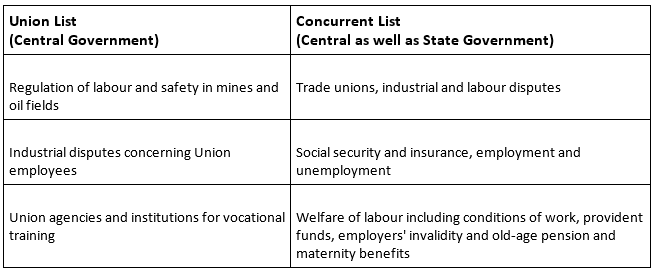

International Labour Organisation (ILO) assured 10 central unions that it has expressed deep concerns over the suspension and tweaking of labour laws by states to the Prime Minister Narendra Modi.
Context
International Labour Organisation (ILO) assured 10 central unions that it has expressed deep concerns over the suspension and tweaking of labour laws by states to the Prime Minister Narendra Modi.
About
Labour jurisdiction in India:
- Under the Constitution of India, Labour is a subject in the Concurrent List where both the Central & State Governments are competent to enact legislation subject to certain matters being reserved for the Centre.
- The constitutional status of labour jurisdiction has been explained in the following table:
Indian Labour Laws:
- Estimates vary but there are over 200 state laws and close to 50 central laws. And yet there is no set definition of “labour laws” in the country.
- The Government has enacted certain central legislations, viz, the Employees Provident Fund and Miscellaneous Provisions Act, Employees State Insurance Act, Payment of Wages Act, Minimum Wages Act, Equal Remuneration Act, Maternity Benefits Act, etc.
- Broadly speaking, they can be divided into four categories.
Challenges in Indian Labour Laws:
- Inflexible rules: Indian labour laws are often characterised as “inflexible”. Due to the onerous legal requirements, firms (those employing more than 100 workers) dither from hiring new workers because firing them requires government approvals.
- Constraint growth: Even the organised sector is increasingly employing workers without formal contracts. This, in turn, the argument goes, has constrained the growth of firms on the one hand and provided a raw deal to workers on the other.
- Unnecessary & too many laws: There are too many laws, often unnecessarily complicated, and not effectively implemented. This has laid the foundation for corruption and rent-seeking.
Background:
- The ILO's intervention came after 10 central trade unions escalated the issue of suspension and tweaking of labour laws with the international body through a letter.
- These unions are INTUC, AITUC, HMS, CITU, AIUTUC, TUCC, SEWA, AICCTU, LPF and UTUC. There are total 12 central trade unions in the country.
- The 10 central trade unions had asked the ILO DG to intervene immediately with the Indian authorities to urge necessary action for the protection of workers rights in the light of measures being taken by a number of state governments to undermine the labour legislation and international labour standards.
- They have pointed out that the central government is contemplating repealing of Inter State Migrant Workmen (Regulation of Employment and Conditions of Service) Act 1979.
- Undertaking a radical set of politically controversial economic reform measures, major states with substantial workforces, have frozen major labour laws, except basic ones, in the hope that businesses will recoup from the blow of the Covid-19 pandemic and create more jobs on a net basis.
Is it a violation?
- India has inked many conventions with ILO which commensurate with the existing legal system and laws of the land.
- A country can ratify a convention with ILO after putting in place all provisions mandated in its laws and legal framework.
- Thus, a change in labour laws or suspending those may lead to violation of these conventions, which are also an international commitment by ratifying nations.
India will have to balance the need for businesses to grow along with maintaining labour safety nets. Labour law reforms, a necessity, have been a long time coming. In the current situation, job security needs to be replaced with the concept of income security.



